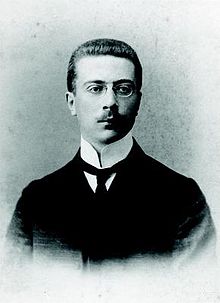Ernst Hellinger
Ernst David Hellinger (born September 30, 1883 in Striegau / Province of Silesia , † March 28, 1950 in Chicago ) was a German mathematician .
Ernst Hellinger studied mathematics at the universities of Heidelberg , Breslau and Göttingen with David Hilbert . He became friends with Max Born during his studies . In his doctoral thesis from 1907 he developed a new type of integral , the so-called Hellinger integral . He later developed the Hilbert-Hellinger theory together with Hilbert . In 1914 he became a professor in Frankfurt. In 1914, in the field of theoretical mechanics , Hellinger contributed significantly to the formulation of the canonical principle of variation, which half a century later would play a major role in the development of the finite element method .
In 1936, as a Jew, he was forced into retirement by the National Socialists . Even after the Reichspogromnacht in 1938 he refused to flee and was arrested on November 13th and deported to the Dachau concentration camp . Following the intercession of influential friends, he was released from the concentration camp after six weeks on condition that he would emigrate. In February 1939 Hellinger traveled to the USA .
There he worked in the field of integral calculus and spectral theory until his death in 1950 . His article Integral Equations and Equations with Infinitely Many Unknowns from 1927 is a classic in the field of integral equations . The Hellinger-Toeplitz theorem is connected with his name.
Web links
- Literature by and about Ernst Hellinger in the catalog of the German National Library
- John J. O'Connor, Edmund F. Robertson : Ernst Hellinger. In: MacTutor History of Mathematics archive .
- Gabriele Dörflinger: Ernst Hellinger . A collection of material from Historia Mathematica Heidelbergensis
Individual evidence
- ^ Karl-Eugen Kurrer : The History of the Theory of Structures. Searching for Equilibrium . Berlin: Ernst & Sohn 2018, pp. 891ff., ISBN 978-3-433-03229-9 .
| personal data | |
|---|---|
| SURNAME | Hellinger, Ernst |
| ALTERNATIVE NAMES | Hellinger, Ernst David (full name) |
| BRIEF DESCRIPTION | German mathematician |
| DATE OF BIRTH | September 30, 1883 |
| PLACE OF BIRTH | Striegau (now Poland) |
| DATE OF DEATH | March 28, 1950 |
| Place of death | Chicago |
